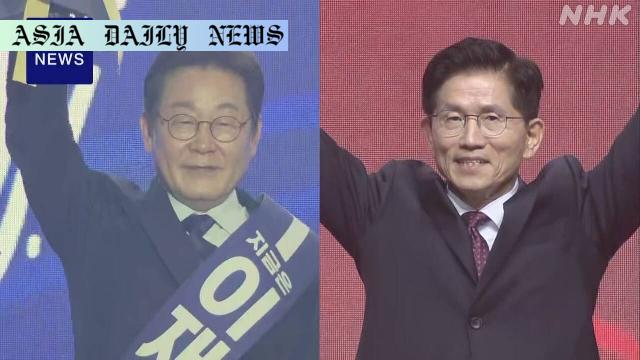Presidential Election: Campaigns kick off for South Korea’s critical presidential race, as candidates focus on economy and democracy restoration.

The Start of an Intense Presidential Campaign
The South Korean presidential election campaign officially commenced this week, marking the beginning of an intense 22-day period as candidates race to secure voter support ahead of the June 3 election. The political drama stems from the impeachment and removal of former President Yoon Suk-yeol, following public disapproval of his martial law controversy in December. Now, the election pits two prominent candidates against each other: Lee Jae-myung of the Democratic Party and Kim Moon-soo of the People Power Party.
Lee Jae-myung, leading the opposition, has launched an aggressive campaign centered on criticism of past governance issues. Stating his intent to restore crumbling democracy and revive South Korea’s economy, he has struck a chord with many South Koreans weary of political chaos. His lead in the opinion polls offers a momentary advantage, though looming legal troubles may taint his reputation.
Key Issues Defining the Election
The election landscape is shaped by issues that range from economic stagnation to the stability of democracy. Kim Moon-soo, who represents the ruling People Power Party, seeks to differentiate himself by placing the economy at the forefront of his campaign. Visiting local markets and engaging with citizens, Kim emphasizes his vision for revitalizing livelihoods and bringing economic hope to South Korea. However, internal divisions within his party could undermine his efforts.
Lee, meanwhile, has been vocal about addressing the democratic backsliding seen during Yoon’s tenure. Both candidates have marked clear policy divides that resonate with their respective voter bases. While Lee garners support from those focused on civil rights and systemic reforms, Kim appeals to conservative voters who align with the government’s current economic policies.
The Role of Public Sentiment and Opinion Polls
Public sentiment remains a critical factor in this election, with opinion polls consistently favoring opposition candidate Lee Jae-myung. Despite allegations of criminal misconduct looming over him, Lee’s sharp critiques of the outgoing administration find favor with disillusioned voters. On the other hand, Kim Moon-soo must work diligently to unify a fragmented conservative base that remains vital to his prospects.
The question of credibility versus policy reforms will weigh heavily on voters. Genuine policy debates have been overshadowed by sensational headlines surrounding Lee’s legal matters and controversies about Kim’s party dysfunction. As election day nears, each candidate must carefully navigate these challenges to win the public’s trust.
What Lies Ahead
The remaining campaign period promises to be a decisive phase in shaping the nation’s immediate political and economic future. South Koreans are looking for a leader who can not only mend deep-seated divisions but also offer actionable solutions to pressing challenges such as economic recovery, job creation, and democratic transparency.
The countdown has begun, and the world watches closely as South Korea prepares to make a historic political choice on June 3. The stage is set for a high-stakes democratic showdown, highlighting contrasts in vision, policy, and leadership styles between Lee Jae-myung and Kim Moon-soo.
Commentary
The Campaign Heats Up: A Bridging Perspective
Presidential elections always hold a mirror to the society they represent, revealing unresolved tensions, societal aspirations, and the character of the national fabric. South Korea’s upcoming election is no different. As we watch the campaigns of Lee Jae-myung and Kim Moon-soo unfold, a complex narrative emerges, embodying both the hopes and anxieties of a nation in flux.
Leadership Amidst Political Turmoil
Lee Jae-myung represents a bold vision for South Korea. His campaign message resonates strongly with those frustrated by what they perceive as governmental mismanagement and lost opportunities under Yoon Suk-yeol. But leadership is about more than bold promises—it’s about trust and integrity, qualities that may be questioned amid his ongoing criminal trials. While his idea of democratic renewal is urgently relevant, does his personal baggage undermine his credibility? It’s a question audibly echoing through South Korea, one citizens must ponder carefully.
A Focus on Stability and Unity
Kim Moon-soo, on the other hand, prioritizes economic revival. His strategy banks on engaging the conservative voter base while presenting practical solutions to South Korea’s mounting economic challenges. Yet, his task is daunting. The infighting within the People Power Party reflects deeper fissures in conservative politics, posing real hurdles to party coherence and public trust. Can he rise above these challenges to become a unifying force?
The Public Dilemma
As a political observer, it’s fascinating and sobering to see how the choice between these candidates mirrors the fault lines of South Korea—be it economic uncertainty, political instability, or ideological divides. This election is more than a political event; it is an inflection point for South Korean democracy. Come June 3, the decision will not just be about who governs, but about the kind of future South Koreans envision for themselves and the generations to come.


